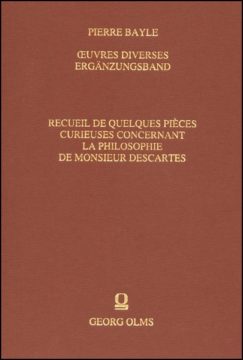Diese Aufsatzsammlung umfasst insgesamt acht zeitgenössische Texte, von denen neben der Einleitung nur zwei bzw. drei aus der Feder Bayles stammen, der hier primär die Rolle des moderierenden Herausgebers einnimmt. Die Publikation dieser Texte – so Bayle – sei im damaligen Frankreich nur schwer möglich gewesen, weil knapp 40 Jahre nach dem Ende der großen Religionskriege das Frankreich Ludwigs XIV. von inquisitorischer Sorge um die Konformität seiner Denker mit dem Katholizismus beherrscht sei und sich auch seinen größten Geistern gegenüber repressiv verhalte, sobald diese an Fragen von religiöser Relevanz rührten. Tatsächlich geht es in den meisten der im Recueil abgedruckten Texte um ein Problem, das mit einem zentralen katholischen Essentiale verknüpft ist: die Vereinbarkeit der Philosophie René Descartes’, dessen Lehre damals an europäischen Hochschulen zunehmend an Einfluss gewinnt, mit der katholischen Abendmahlslehre und ihrer Annahme einer Realpräsenz von Leib und Blut Christi im Eucharistiesakrament. Die Auseinandersetzung mit dem Vorwurf, Descartes verstoße mit seiner rationalen Physik gegen ein zentrales katholisches Dogma, kann man als Ausdruck einer rational begründeten Kritik Bayles an der katholischen Abendmahlslehre und ihrer substanzmetaphysischen Grundlegung auffassen.
***************
This collection contains eight contemporary texts. Apart from the introduction, only two or three were written by Bayle himself, whose primary role here was as a co-ordinating editor. According to Bayle it was very difficult to publish these texts in France at the time because, 40 years after the great Wars of Religion had ended, Louis XIV’s France was ruled with inquisitorial concern for her intellectuals’ conformity with Catholicism, and adopted a repressive attitude even to her greatest thinkers as soon as they touched on themes of religions relevance. Most of the texts in the Receuil are indeed concerned with a problem linked to one of the core essentials of Catholicism: the compatibility of René Descartes’ philosophy, which was increasingly influential in the European universities of the time, with the Catholic doctrine of the Eucharist and its assumption of the Real Presence of Christ in the sacrament. The debate over the accusation that Descartes’ rational physics was a transgression against a central Catholic dogma can be understood as the expression of a rationally based critique by Bayle of the Catholic doctrine of the Eucharist and its foundations in the metaphysics of substance.
- Veröffentlicht am Montag 9. Dezember 2024 von Olms, Georg
- ISBN: 9783487145365
- 357 Seiten
- Genre: Aufklärung, Hardcover, Philosophie, Renaissance, Softcover
